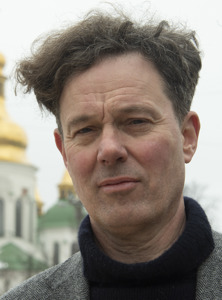
Richard Pendlebury
The Daily Mail, MailPlus and MailOnline
‘Under a different circumstance, this would be the perfect winter’s day for a walk in the woods,’ he wrote in February, describing how he and photographer Jamie Wiseman had been given privileged access to troops in the frontline sectors of eastern Ukraine most threatened by an expected Russian winter offensive. 'Like hooded wraiths, two Ukrainian soldiers in white camouflage overalls have just stepped from among the trees to greet us, assault rifles slung over their shoulders. This way and quickly, they say. ‘We go that way and quickly, because today is also ideal for drone warfare and the Russian frontline and its numerical superiority in such weapons is well within range. ‘These are the places where a badly mauled but still determined and largely volunteer, middle-aged army, is dug into the snow and ice — in preparation for a new Kremlin onslaught.’
As so often with Pendlebury’s reports, these dispatches were accompanied by short videos which have been viewed millions of times online.
They demonstrate once again his appetite for daring first-hand pieces sent from the heart of the action. None have been more heart-stopping than his account in July of being pursued by a Russian kamikaze drone while being driven by soldiers from a Ukrainian special reconnaissance unit. ‘For the last mile of this otherwise charming country lane, flanked by birch trees and wildflowers, the red plastic exclamation mark on the box’s fascia has been flashing in time with the beeps. ‘A warning message has also appeared on the box’s digital display, adding to the sense of impending doom.
The drone comes no closer and they reach the small town of New York, named for the Big Apple, only hours before the Russians break through the Ukrainian lines and reach the city limits, pounding the city with a powerful glide bomb.
With the third anniversary of the invasion approaching in October, Pendlebury highlighted the mental toll on Ukrainian soldiers and citizens, gaining the confidence of a company commander called Kos who told him that ‘going crazy’ was ‘100% inevitable.’ 'When, for example, you sit under shells for a week or if you encounter a Russian in a trench every other day and shoot him right in front of you, seeing all the gore, then of course you will start losing it [mentally].’
Writing from what he described as the ‘doomed’ city of Kurakhove, Pendlebury warned that ‘Russia is expected to redouble its missile blitz on Ukraine's power stations. Millions of homes will no doubt go without light or electricity again in the coldest, darkest, most bitter months. It is deliberate psychological warfare. ‘Kurakhove might fall but…. embattled Ukraine must not lose its determination to endure.’